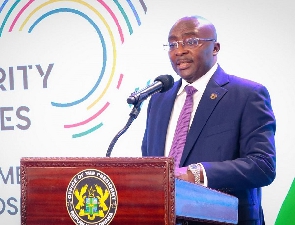 Vice President, Dr. Mahamudu Bawumia
Vice President, Dr. Mahamudu Bawumia
The Vice President, Dr. Mahamudu Bawumia has proposed three broad areas of focus, which he believes will help the African Continental Free Trade Area (AfCFTA) to bring about the transformation Africa needs.
Addressing a high-level conference in Accra of African Ministers of State, diplomats, policymakers and business executives, who are discussing ways of fast-tracking the implementation of the AfCFTA, Dr. Bawumia said even though the AfCFTA has set the stage for the transformation of Africa, its full prospects can only be realised through decisive steps by key African stakeholders, and a focus on some key broad areas he proposed.
“Like the vision of our forebears, the African Continental Free Trade Area has set the stage for Africa’s industrialisation drive, but, it will take concrete, strategic actions by governments and businesses on the continent, the right mix of policies, a greater sense of purpose for more robust intra-African trade to happen to support economic diversification and the much-needed industrialisation of the continent,” Dr. Bawumia said.
“To bring about the transformation we need, I propose three broad areas that we need to prioritise,” he added.
“First is the need for smart investments in critical infrastructure. As a continent, we need to produce and trade our way out of poverty and underdevelopment, and we cannot do that without investing in smart infrastructure across the continent. While the last decades have seen some positive investments, there is the need for additional resources to finance the ‘arteries for trade’, which include the physical infrastructure such as roads, rail, and energy; digital infrastructure such as data centres to facilitate the digital transformation and financial infrastructure to allow for integration financial markets.”
These investments, Dr. Bawumia noted, will be critical to delivering the success of the AfCFTA.
The second proposal the Vice President made “is to unleash the productive capacities across the continent.”
“We must create platforms for knowledge brokerage and access to information on critical products and services on the continent to allow 445 million small businesses across the continent to plug into the value chains of these mega industries. We need to develop Africa into a manufacturing zone that will facilitate the trade of value-added products. These, in my view, will be critical to leapfrog Africa’s industrialisation and the enormous socio-economic benefits.”
Dr. Bawumia added that the third broad area of focus should be mobilising finance and investments.
“Africa needs between US$ 130 billion and US$ 170 billion annually to bridge its infrastructure gap and generate sustainable growth at 5% per annum or more. This presents immense opportunities for the private sector investment,” he noted.
“Attracting private sector participation through Public-Private Partnerships (PPPs) is therefore, essential for the delivery of various infrastructure projects. Furthermore, there is a need for innovative policies to mobilise and allocate resources more effectively, and for better coordination amongst all African stakeholders and international partners.”
Africa's worrying contribution to global trade
While bemoaning Africa’s limited intra-African trade, as well as the continent’s low contribution to global trade, Dr. Bawumia expressed optimism that an effective implementation of AfCFTA will create greater opportunities for Africa to reverse the unfortunate situation.
“As most of you know, Africa accounts for about 3% of global trade and intra-African trade is one of the lowest of any region globally. This is largely due to the “colonial” economic model characterised by small individual economies, fragmented and disconnected regional markets, over-reliance and low productive capacities that we have practised for 60 years.”
“As growing economies, we often struggle to attract much-needed investments. However, with the collaborated strength from all fifty-five (55) member states, with a population of 1.2 billion, the majority of whom are young, and a GDP of US$ 2.5 trillion, making Africa the eighth (8th) largest economy in the world, this positions Africa as an attractive investment destination. With the right investment, we will be able to sustain economic growth and create the job opportunities that the continent desperately needs.
“The AfCFTA is a real game-changer, and once fully realised, we can increase intra-African trade by some US$ 35 billion and reduce external imports by some US$ 10 billion annually.”
“This will mean more opportunities for growth and for our small businesses and the potential to lift more than 3 million people out of poverty.”
Partners of the three-day conference are: the African Continental Free Trade Area (AfCFTA), the Africa Prosperity Network, the United Nations Development Programme (UNDP), United Nations Economic Commission for Africa (UNECA) and the Ghana Investment Promotion Centre.